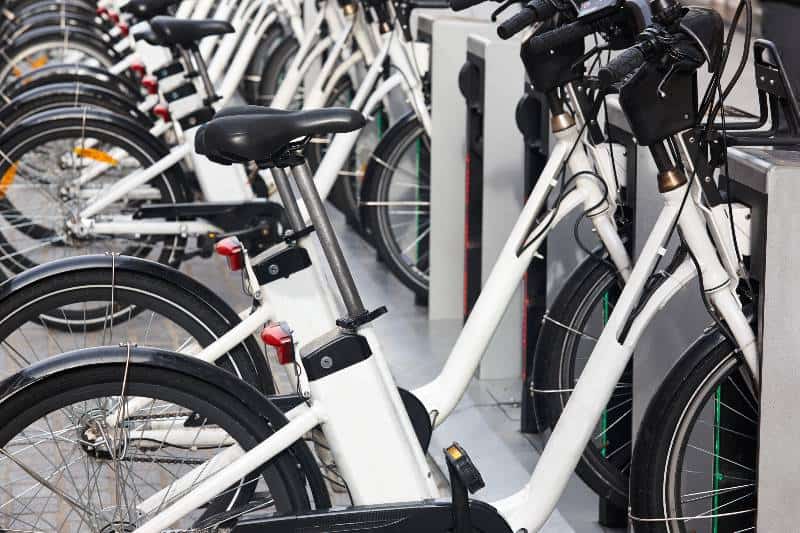How Much Does it Cost to Charge an E-Bike? How to Calculate it
How Much Does it Cost to Charge an E-bike? Many people are curious about the cost of setting up electric bikes and how to calculate them. In this blog post, we will discuss the cost of charging an e-bike, as well as how to calculate it. We’ll also provide some tips on reducing your e-bike charging costs. So, whether you’re just starting with e-bikes or you’re looking for ways to save money on charging them, this post has something for you!
The cost of charging an e-bike differs leaning on the battery capacity, battery voltage, and the local electricity rate.
Key Takeaways
- In the United States, the average cost to charge an e-bike is only 5 cents per kilowatt-hour or less than $22 per year.
- This is a great deal less expensive than the $ 540-year average cost of charging an electric automobile.
- E-bikes are anticipated to gain popularity as more individuals look for ways to reduce their transportation costs.

What Is the Real Cost of Charging an E-Bike?
How much does it cost to charge an e-bike? Well, here’s our answer.
Electric bicycles are becoming an increasingly popular mode of transportation, and their popularity is only expected to grow in the coming years. One of the main appeals of e-bikes is their low cost of ownership – in addition to being cheaper to purchase than a traditional bicycle, they are also much cheaper to operate.
The average cost of charging an e-bike in the United States is just 5 cents per kilowatt-hour, which works out to less than $22 per year. This is significantly cheaper than the average cost of charging an electric car, which is around $540 per year. As more people look for ways to save money on transportation, e-bikes are likely to become an increasingly attractive option.
Charging an E-Bike: how to calculate the cost?
Factoring in Battery Cost
Electric bike Batteries are a vital part of electric bikes, and they need to be regularly charged to keep the electric bike running. However, batteries also have a limited lifespan and will eventually need to be replaced.
When factoring in the cost of batteries, it’s important to consider not only the initial price of the battery but also the number of charging cycles it can handle before it needs to be replaced.
For example, if a new battery for an electric bike costs $500 and has an average cycle life of 800 charges, the cost per charge is $0.625.
Remember that while this is a considerably larger figure than the cost of charging your bike, it all depends on the sort of battery you have and how frequently you charge it. This expenditure might be spread out over five years. Even with this in mind, the cost per mile is still quite low when compared to other modes of transportation.
Calculate Cost Per Mile/Kilometer
To compute the cost per mile/kilometer, you need to multiply the range by the charging cost.
For example, if the charging cost is $0.054 and the range is 20 miles, then you would multiply 20 by $0.054 to get $1.08.
This means that it would cost you 1.08 cents to travel one mile in this vehicle. You can also divide the cost per mile/kilometer by the number of miles you plan to travel to get the percentage of miles that will be covered by the charge.
For example, if you divide 1 mile by 0.27 cents, you will get 3.7 percent. This means that for every 100 miles you travel, 3.7 miles will be covered by the charge.
Calculating Battery Watt-Hours
When you’re shopping for an e-bike, it’s important to know how far you can expect the battery to take you on a single charge.
The most important factor in determining range is the battery size, measured in watt-hours (Wh). To calculate this, multiply the voltage (V) by the amp hours (Ah).
For example, a lithium-ion battery has 48V x 14 Ah = 672 watt-hours (Wh), giving you an expected range of 25-45 miles on a single charge.
However, many other factors can affect your bike’s range, including speed, terrain, bicycle weight, level of pedal assist, throttle usage, rider body weight, cargo weight, wind, cadence, and regenerative braking capabilities.
By taking all of these factors into account, you can get a better idea of how far your bike will take you on a single charge.
What About Kilowatt-Hours?
You may also see battery size advertised in kilowatt-hours (kWh). This is simply a unit of measurement that is equal to 1000 watt-hours.
For example, a 48V x 14 Ah battery has a capacity of 0.672 kWh. You can use this number to calculate the cost of charging your bike
The average cost of charging an E-Bike for a year
In the US, the average cost to charge an e-bike is 5 cents ($21.17 per year). This is quite a bit cheaper than the average of the 24 countries. The cost of charging an electric car in the US is about $540 per year.
Cost to charge an electric bike in other countries
| Country | Cost per charge (USD) | Cost per charge in local currency | Cost per year (USD) | Cost per year in local currency |
| Austria | $0.09 | €0.07 | $37.46 | €32.57 |
| Belgium | $0.10 | €0.09 | $45.60 | €39.09 |
| Brazil | $0.05 | R$0.26 | $21.17 | R$114.00 |
| Canada | $0.04 | $0.06 | $17.92 | $24.43 |
| China | $0.03 | ¥0.20 | $13.03 | ¥87.95 |
| Colombia | $0.07 | $255.20 | $29.32 | $111,012.99 |
| Finland | $0.06 | €0.05 | $27.69 | €22.80 |
| France | $0.07 | €0.06 | $30.94 | €26.06 |
| Germany | $0.12 | €0.10 | $53.75 | €45.60 |
| India | $0.03 | ₹2.20 | $13.03 | ₹957.64 |
| Indonesia | $0.04 | Rp555 | $16.29 | Rp241,312 |
| Italy | $0.10 | €0.09 | $43.97 | €37.46 |
| Japan | $0.08 | ¥8.62 | $35.83 | ¥3,750.76 |
| Netherlands | $0.07 | €0.06 | $29.32 | €24.43 |
| New Zealand | $0.07 | $0.11 | $32.57 | $48.86 |
| Poland | $0.06 | 0.23 zł | $26.06 | 99.35 zł |
| Portugal | $0.10 | €0.08 | $42.34 | €35.83 |
| South Africa | $0.03 | R0.57 | $14.66 | R245.92 |
| South Korea | $0.04 | ₩52.37 | $19.54 | ₩22,781.42 |
| Spain | $0.09 | €0.07 | $39.09 | €32.57 |
| Sweden | $0.08 | 0.70 kr | $34.20 | 302.93 kr |
| Turkey | $0.06 | ₺0.43 | $24.43 | ₺187.29 |
| United Kingdom | $0.08 | £0.06 | $35.83 | £27.69 |
For a year, it costs more in the United States to maintain an electric bike charged than it does in China or India, where it costs only 3 cents per charge.
Tips to Reduce Electric Bike Battery Charging Costs
Obtaining a lower cost per unit (kWh) will lower the overall cost of charging your battery. If you have a suitable plan, you can charge during off-peak hours. Electricity companies typically provide lower per-kWh pricing during off-peak hours to encourage users to use less electricity (also to save and have lower electricity bills!) during peak hours (approx. 9 pm to 7 am).
E-bikes are growing in popularity as a renewable and low-cost alternative to traditional bicycles. While they may require a small amount of electricity to charge the battery, the overall electricity consumption required is very low.
They are often powered by renewable energy sources, such as solar panels or wind turbines. This makes them an environmentally friendly option for those who want to reduce their carbon footprint. And because they don’t produce emissions, they’re also much kinder to the air we breathe. Whether you’re looking for a way to save money or be more eco-conscious, e-bikes are worth considering.
How Does Battery Wear Factor Into the Cost?
If you’re looking to save money on your electric bill, one of the best things you can do is charge your battery during off-peak hours. Most electricity providers offer lower rates per kWh during these times, so you’ll end up paying less overall.
Plus, charging your battery during off-peak hours helps to reduce demand on the grid during peak times, when everyone is using electricity. So not only will you be saving money, but you’ll also be doing your part to help reduce stress on the electric grid.
But, how much electricity is it? Just be sure to check with your electricity provider to see how much electricity costs offer off-peak hours before you start charging.

Charging E-bike Battery FAQs
Are e-bike batteries expensive?
E-bike batteries are one of the most expensive elements of an e-bike, typically costing around $500. However, if the battery needs to be custom produced and fitted, it can cost as much as $1000. The battery is what powers the motor, which is how an e-bike moves. The battery needs to be regularly charged, and it will eventually need to be replaced. Consequently, the price of an e-bike battery is a significant factor in the overall cost of an e-bike.
Should I charge my e-bike battery after every ride?
Depending on how often you ride, you may find that you need to charge your e-bike battery more or less frequently. However, we generally recommend charging the battery after each ride to ensure that it is always ready for your next adventure.
Before charging, be sure to turn off the battery using the switch on the battery (if there is one). This will help prolong the life of the battery and make sure that it charges fully. Once the battery is turned off, simply plug it into a standard outlet and let it charge overnight. With proper care, your e-bike battery will provide years of reliable power.
Should I charge my e-bike battery to 100%?
Owning an e-bike is a great way to reduce your carbon footprint and get some exercise, but it’s important to know how to properly care for your bike’s battery. For most people, charging the battery after each ride is not necessary.
It’s best to wait until the battery is down to about 30% or 40% before plugging it in. This will help prolong the life of the battery. When you do charge it, try to stop at 85% capacity. This is the ideal charging level for most e-bike batteries. So next time you’re wondering whether to charge your battery, remember that less is usually more. Your battery will thank you for it.
How long should I charge my e-bike battery?
The length of time it takes to charge an e-bike battery varies depending on the type of battery and the charger used. Most batteries can be fully charged in 4 to 6 hours, but some may take longer.
It’s also important to note that batteries can be charged either on or off the electric bike. And, because lithium batteries don’t have “memory,” they can be charged at any time – you don’t have to wait until the battery is completely depleted before recharging. So, if you’re wondering how long to charge your e-bike battery, the answer is: it depends. But in general, most batteries can be fully charged within 4 to 6 hours.
Can I leave my e-bike on charge overnight?
Most e-bike batteries can be charged overnight without any problems. However, it is important to check your owner’s manual to make sure that your specific e-bike model can be left on charge for an extended period. Some older models of e-bikes may not be designed for overnight charging, and attempting to do so could damage the battery.
In general, however, most modern e-bike batteries can be safely charged overnight without any issues. So if you’re ever in a pinch and need to charge your e-bike battery in a hurry, don’t hesitate to leave it on charge overnight.
Conclusion
E-bikes are good because they provide renewable energy devices that can help power electronic devices. E-bikes are powered by batteries, which can be recharged by pedalling or through the use of a solar panel.
The renewable energy provided by e-bikes can help to reduce our reliance on fossil fuels, and the emissions from e-bikes are much lower than those from conventional bikes. In addition, e-bikes have more efficient batteries than conventional bikes, and they require less maintenance. As a result, e-bikes are a good choice for those who are looking for an environmentally friendly and efficient mode of transportation.
Thanks for reading our article on how to calculate the cost of charging an e-bike. We hope you found it helpful. Be sure to check out our other articles on our website for more valuable information.






